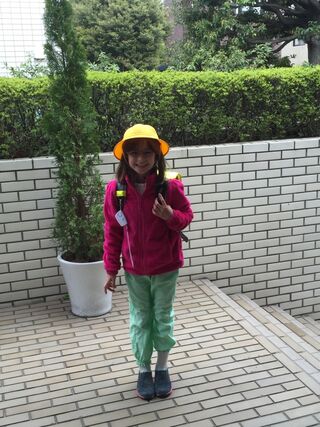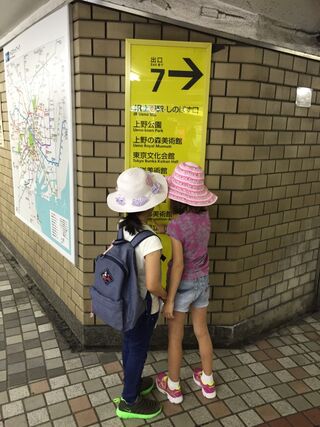Confidence
The 5 Non-Negotiables to Build True Community
Lessons from "Old Enough!" on Netflix
Posted April 22, 2022 Reviewed by Tyler Woods
Key points
- The Netflix show "Old Enough!" is new to the U.S., but old news in Japan.
- Japan, in policy and practice, make communities abundantly safe for members of all ages.
- Giving children independence at young ages fosters confidence and self-efficacy.
Would you allow your three-year-old toddler to run an errand into town on their own? Maria Montessori, famed advocate for childhood autonomy and founder of Montessori schools worldwide, would encourage it. She believed that independence is, “a task [children] must accomplish in order to grow” (First Discoverers, 2022).
In Japan, that’s the norm. While I was living in Tokyo with my three children from 2012 to 2016, it was a common sight to see young children wearing yellow badges or waving a flag indicating that they were traveling alone for the first time. These children might get lost, ask for help, or stop and play with worms in the dirt. It was a delightful rite of passage.
A long-running, popular show in Japan titled “My First Errand” has (finally) reached the U.S. as Netflix recently acquired the rights to several seasons. It has been retitled “Old Enough!”

Each episode is only a 10- to 15-minute heartwarming story of a young child literally tottering off into their neighborhood (many times forgetting the errand they were sent to do). But they always have fun and eventually find their way back home to mom and dad. There are tears and hugs galore before and after the child completes their errand, but mostly rapt with pure joy. Ultimately, the featured child is imbued with a new sense of confidence while their parents beam with pride.
In the U.S., sending your three-year-old into town sans supervision to fetch sausage for dinner at a grocer (episode 1) or having your four-year-old stay home alone and make orange juice from scratch with kitchen appliances (episode 2) may lead to an investigation by Child Protective Services. But in Japan, they have long made policy and parenting choices ensuring it was safe for kids to enjoy such freedom. Jessica Grose referenced a recent CDC survey in her New York Times column that found “American adults believed, on average, that a child could be left at home alone at 13, bathe alone at 7½ and bike alone at around 10." Quite the difference.
As I remarked in my book, World Class:
“It’s hard to let go of kids, especially at such a young age, but Japanese parents give their children more room to solve their own problems than we tend to do in the States. There is an unspoken commitment to the greater community” (Clavel, 137).
Japan walks the walk. It is a nation that truly lets kids be kids, safely, for as long as possible.
Independence in children promotes self-esteem and confidence which later morphs into motivation and success in school and future careers—it also teaches children to help those around them (First Discoverers, 2022).
Japanese children are taught to politely speak with strangers rather than run away from them. They waddle up to adults and feel comfortable enough asking for assistance, saying hello, or telling them their favorite color and snack. Every person is a member of the community and the community members look out for one another like they are their own children.
Personal Experience
In Tokyo, when each of my children walked home alone from school each day starting at age six, I was, admittedly, a nervous nelly, initially. The American in me wondered what I was thinking letting them do such a thing. Every day, I would stare down the street waiting to see their yellow hats, so I could breathe again. My eldest began taking longer and longer to arrive home each day.
So, one day, I followed him.

Turns out he had become a regular at a small convenience store (combini) on his route home. He would pop in, the owner would nod at him, and he would voraciously consume the newspapers at the stand, completely losing track of time. When he realized he was late (or finally finished the paper), he would hastily put the crumpled-up paper back on the shelf, wave, and leave.
To this day, my son adores reading about current events. I must give credit to that kind man who let a young boy come in to read the news each day and never pay a cent. That’s community.
5 Non-Negotiables to Build Community
- Trust. Communities with a foundation and intentional practice and prioritization of trust are inclusive and caring of all its members. You may not like someone, but you look out for them. In Japan, generation after generation, public policy supports this mindset.
- Care. Looking out for all. It means extending kindness and hospitality when nobody is watching and whenever the opportunity arrives. Further, one has no issue doing so because everyone else in the community will offer the same without hesitation.
- Empathy. An essential element to caring communities is acknowledging that everyone ventures on different journeys at different periods in their lives, but from all journeys comes personal growth. Life is a continuum with our varied individual peaks and valleys, for all. The children who set out on their first errands in Japan will feel scared at times, but the adults witnessing the scene all fondly recall their own first errands and understand how important it is.
- Safety. When a society is truly built on ideals like respect and autonomy, the result is a culture that promotes safety. People of all genders, ages, and stages not only feel safe walking around and conducting their business on the streets of Japan at all hours, they enjoy and revel in the opportunity. Every day is another chance, a freedom to follow your heart without fear of what lurks behind a corner.
- Education. The lessons children learn at young ages in Japan are among the best lessons life has to offer. They learn autonomy, earn confidence, and revel in the pride of the parents and community for being brave and achieving a task. Better yet, they are socialized to immediately give back to their communities before they even begin primary school.
A lesson I learned as a parent raising kids in Asia:
“While our instincts may be to fix situations so kids avoid pain, we shouldn’t deprive them of valuable learning experiences that can guide them later in their lives” (Clavel, 139).
Children learn best through natural consequences. Allowing children to experience the natural consequences of their actions results in resilient children capable of solving their own problems (Shrier, 2015).
Conclusion
In Grose's piece, she writes, “We should at least entertain the idea that Americans have overrotated on protectiveness in the past few decades and need to reconsider letting their kids do more by themselves." I agree.
I muse in World Class:
It’s a joy to see kids finding their own agency, exercising their curiosities and learning about the consequences of their choices on their own, without parents hovering or teachers lecturing. I’ve watched with amusement as a group of umbrella-carrying first graders at a busy sidewalk were so busy sloshing about that they missed numerous green lights. (Clavel, 136).
I fully understand the cascade of emotions parents experience letting their children go. I only offer that if a community is truly a community, it’s better for children to do so sooner than later. Autonomy at a young age is powerful. And a lesson I hope we can find ways to support.
References
Clavel, Teru. (2019). World Class: One Mother's journey halfway around the globe in search of the best education for her children." Simon and Schuster.
First Discoverers. (2022). Why Child Independence is Important. www.firstdiscoverers.co.uk/encouraging-child-independence/
Grose, Jessica. (2022). On Japan’s Adorable “Old Enough!” Show and the State of American Childhood. New York Times. https://www.nytimes.com/2022/04/16/opinion/old-enough-kids-parents.html.
Shrier, Carrie. (2015). Developing Independence in Children. MSU Extension. Michigan State University. www.canr.msu.edu/news/developing_independence_in_children.
Silver, Dina. (2022). Old Enough! [Streaming series]. Japan: Netflix.




